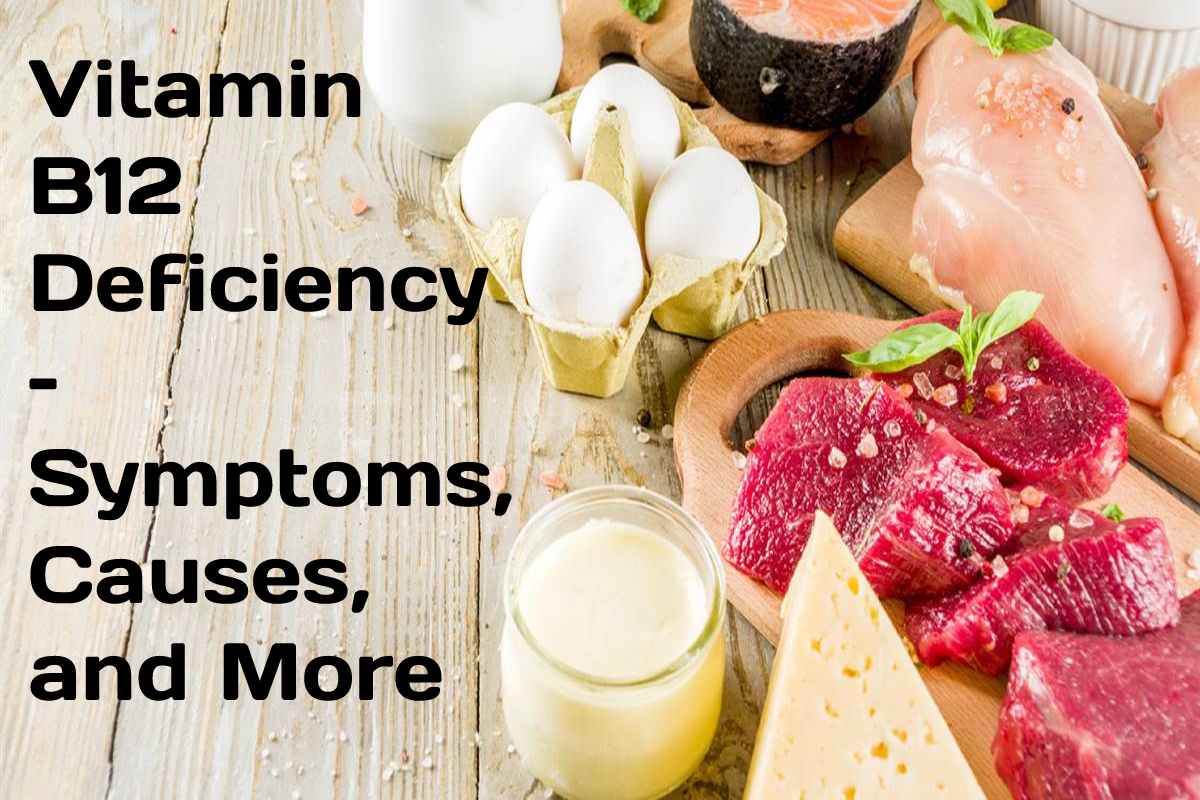Table of Contents
Vitamin B12 Deficiency
Vitamin B12 deficiency may main to a reduction in healthy red blood cells (anaemia). The nervous scheme may also be artificial, and diet or certain medical circumstances may be the cause.
Symptoms are rare but can contain fatigue, breathlessness, impassiveness, poor balance, and memory trouble. The treatment comprises dietary changes, B12 shots, or supplements.

Symptoms of Vitamin B12 Deficiency
Vitamin deficiency anaemia usually grows slowly over several months or years. Signs and symptoms may be subtle initially but usually worsen as the deficiency progresses. These may include:
- Fatigue
- Difficulty breathing
- Pale or pale skin
- Irregular heartbeat
- Weight loss
- Numbness or itchy in the hands and feet
- Muscular weakness.
- Change in personality
- Unsteady movements
- Mental confusion or forgetfulness
What Causes Vitamin B12 Deficiency?
If you don’t eat sufficient foods with vitamin B12, you can develop vitamin B12 deficiency anaemia. For example, if you follow a strict vegetarian or vegan diet. But this is rare. Vitamin B12 deficiency anaemia is another common risk factor for anaemia in the United States.
You can grow vitamin B12 deficiency for the following reasons:
Intrinsic factor deficiency: Intrinsic factor is a protein produced in the stomach, which helps the body absorb it. People who have pernicious anaemia do not develop hereditary factors. Pernicious anaemia is more common in people of African or Northern European descent. If your body doesn’t absorb enough vitamin B12 from the foods you eat, you can develop deficiency anaemia. Older adults are extra likely to have peptic problems that make it challenging to grip vitamin B12.
- Lifestyle habits: Drinking too far alcohol can make it stiffer for your body to absorb vitamin B12. For men, that’s more than two drinks a day, and for women, that’s more than one drink a day.
- Medications: Some medicines can make it harder for your body to absorb vitamin B12 over time. These include certain heartburn medications and metformin to treat diabetes.
- Medical conditions: Certain conditions can increase the risk of vitamin B12 deficiency anaemia. These contain:
- Autoimmune diseases, such as celiac illness, type 1 diabetes, and thyroid disease
- Chronic pancreatic disease
- Genetic situations, such as Imerslund-Grasbeck syndrome, hereditary intrinsic factor deficiency, and hereditary transcobalamin lack
- Intestinal and gastric conditions, such as ulcerative colitis, Crohn’s disease, and Helicobacter pylori infection
- Vitiligo External
- Abdominal surgery: Abdominal or intestinal surgery, such as weight loss surgery or a gastrectomy, can make it harder for your body to engross it.
Effect of deficiency on children
The effects of its deficiency in children are particularly problematic. Studies show that children on a vegan diet up to six years of age are deficient in vitamin B12 even after eating minimal animal products. In one study, researchers found a suggestion between a child’s B12 status and their performance on tests that measure:
- Local capacity
- Fluid Intelligence
- Limited memory
The researchers found that vegetarian children scored lower than their non-vegetarian counterparts in all areas.
“Moreover, the study explored the benefits of continuous glucose monitoring CGM for non-diabetics, revealing potential advantages in managing weight and improving overall metabolic health.”
Researchers said that a decline in fluid intelligence is particularly problematic because it affects a child’s ability to aim, solve complex problems, and learn and engage in abstract thinking. Defects in any of these areas can have long-term consequences for children.
How to treat deficiency
One of the great tragedies of the vitamin B12 epidemic is that diagnosis and treatment are relatively easy and inexpensive, especially compared to the treatment patients need if they are in the final stages of deficiency.
The appropriate treatment depends on the underlying mechanism causing the problem. People with pernicious anaemia or inflammatory bowel disorders such as Crohn’s disease may experience life-long complications and may need vitamin B12 injections indefinitely. It may also be true for people whose severe deficiency causes neurological symptoms.
Some recent studies have suggested that high-dose oral or nasal supplements may be as effective as injections for deficient people. However, most vitamin B12 experts still recommend injections for people with pernicious anaemia and advanced neurological symptoms.
The stages of a deficiency
Its deficiency occurs in four stages, starting with decreased blood levels of the vitamin (stage I), progressing to low cellular absorptions of the vitamin (stage II). Increased blood homocysteine levels, reduced DNA synthesis (stage III) rate, and macrocytic anaemia (stage IV).
Change your diet
Nutritious your body with whole foods is the best way to get the necessary vitamins and nutrients. If you’re low on B12, try eating approximately vitamin-rich diets like:
- Liver
- Seafood
- Clams
- oysters
- organ meats
Eating other shellfish, such as octopus, fish eggs, lobster, and crab, can also help you reach normal B12 levels. If you’re averse to shellfish, you can also get this vitamin from:
- Cordero
- Cow meat
- Eggs
- Queso
Though, it is vital to memo that the amount of B12 in these foods is not as high as the levels in shellfish and organ meats.
Conclusion
Vitamin B 12 deficiency is a common problem, especially in the elderly, and case finding is based on clinical suspicion. Currently, no population screening recommendations have been reputable, although they consider after 50 years of age.

